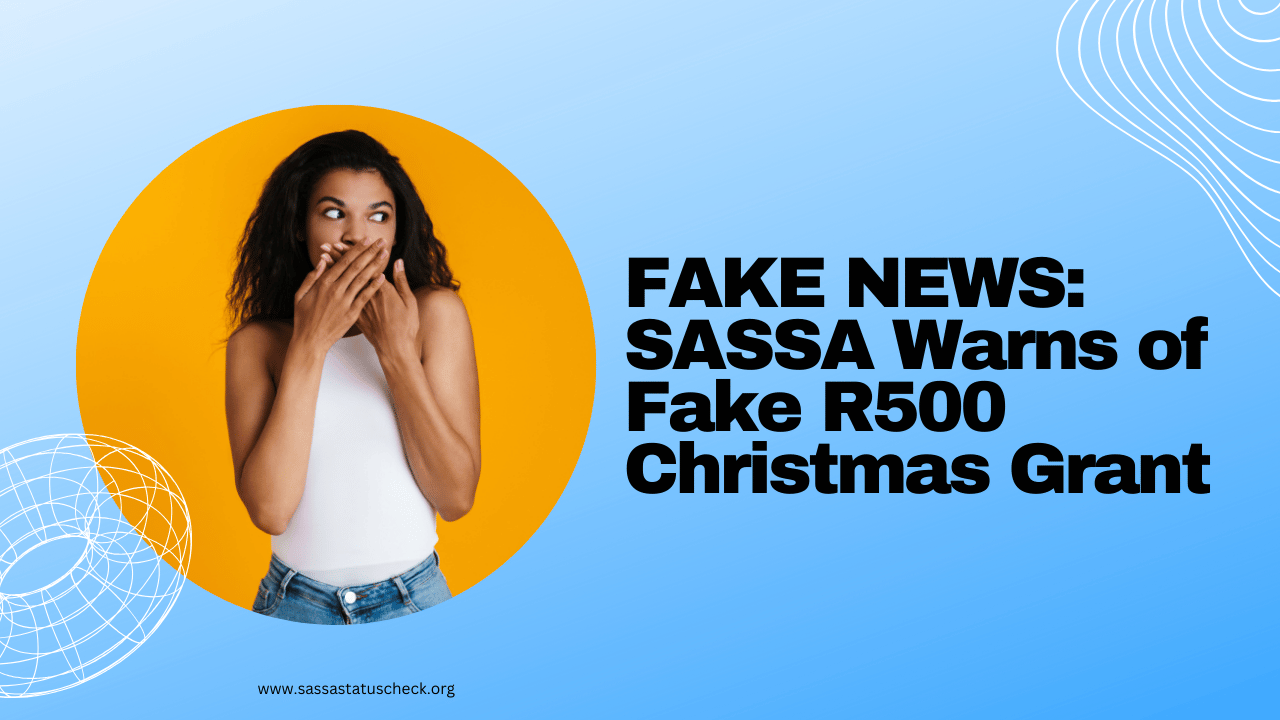The South African Social Security Agency (SASSA) has issued a warning to South Africans regarding a fake R500 Christmas cash grant that has been circulating online.
Fake news and scams have become increasingly common in the digital age, exploiting people’s vulnerabilities and creating false hopes. The recent fake R500 Christmas grant targeting South African citizens is a prime example of such malicious activities.
This article provides a comprehensive overview of the issue, including SASSA’s response, the impact on the public, and steps to verify legitimate information.
The Fake R500 Christmas Grant:
What is the Fake Grant?
The fake R500 Christmas grant is a fabricated social media post or message claiming that SASSA is offering a special Christmas cash grant to all South Africans. Scammers often use official logos and professional-looking graphics to make their claims appear legitimate.
How It Circulates
This hoax typically spreads through:
- WhatsApp messages
- Social media platforms like Facebook and Twitter
- SMS and email scams
Table 1 below outlines the common characteristics of these fake messages.
| Platform | Message Style | Red Flags |
|---|---|---|
| Forwarded messages | No official SASSA contact | |
| Facebook/Twitter | Posts with fake SASSA logos | Links to unverified websites |
| SMS/Email | Personalized messages | Requests for personal details |
SASSA’s Response
Official Statement
SASSA has categorically denied offering any such Christmas cash grant. The agency released an official statement warning the public not to fall for these scams and urging them to rely only on verified communication channels.
Ongoing Awareness Campaigns
To combat the spread of misinformation, SASSA has launched:
- Social media alerts: Regular updates on verified platforms.
- Community outreach: Workshops and seminars educating citizens about fraud prevention.
The Impact of Fake News on Society
Emotional Toll
Fake news like the R500 grant creates false hope among vulnerable individuals, especially during the festive season.
Many recipients of social grants already face financial hardships, and such scams exacerbate their struggles.
Financial Risks
Scammers often use these fake offers to:
- Steal personal information.
- Extract money from victims through “processing fees.”
Erosion of Trust
Continued scams can undermine trust in legitimate institutions like SASSA, making it harder for the agency to communicate effectively with the public.
Table 2 highlights the broader impact of fake news.
| Impact Area | Description |
| Emotional Stress | Creates false hope and subsequent disappointment |
| Financial Loss | Victims lose money through fees or identity theft |
| Institutional Trust | Undermines credibility of official organizations |
How to Spot Fake News
Key Indicators of a Scam
- Too Good to Be True: Claims of free money or rewards with no effort required.
- Unverified Sources: Messages originating from unofficial channels.
- Requests for Personal Information: Legitimate organizations will never ask for sensitive data via SMS or social media.
Steps to Verify Information
- Check Official Websites: Visit SASSA’s website.
- Contact Directly: Call SASSA’s toll-free number for confirmation.
- Look for Verified Badges: Only trust social media posts from accounts with a verified badge.
Table 3 provides a comparison of real versus fake communications.
| Criteria | Real Communication | Fake Communication |
| Source | Verified website or hotline | Unknown or unverified links |
| Language | Professional and clear | Often riddled with errors |
| Personal Details | Never requested | Frequently requested |
Steps to Protect Yourself
Precautions to Take
- Educate Yourself: Stay informed about common scams.
- Avoid Clicking on Links: Do not click on suspicious links.
- Report Scams: Notify SASSA or the South African Police Service (SAPS).
Helping Others
Community awareness is key to combating fake news. Share verified information with friends and family to prevent them from falling victim.

Real Grants and Benefits from SASSA
Current Offerings
SASSA provides a range of social grants to support eligible South Africans, including:
- Old Age Pension
- Child Support Grant
- Disability Grant
Table 4 lists the available grants and their respective eligibility criteria.
| Grant Type | Monthly Amount | Eligibility Criteria |
| Old Age Pension | R2,080 | Citizens aged 60+ meeting income criteria |
| Child Support Grant | R500 | Parents or guardians of children under 18 |
| Disability Grant | R2,080 | Individuals with medically confirmed disabilities |
Verifying Real Grants
Always consult SASSA’s official channels for accurate information on grants and eligibility.
Conclusion
The fake R500 Christmas grant is a stark reminder of the dangers of fake news and scams. By staying informed and vigilant, South Africans can protect themselves and their communities.
Always rely on official sources like SASSA’s website or hotline for accurate information and report any suspicious activity immediately.
Together, we can combat the spread of misinformation and ensure that fraudsters do not exploit vulnerable individuals during the festive season or any other time of the year.
FAQs
What is the fake R500 Christmas grant?
The fake R500 Christmas grant is a scam circulating on social media, falsely claiming that SASSA is offering free money during the festive season.
How can I verify if a SASSA message is real?
Check the official SASSA website or contact their toll-free number. Avoid relying on forwarded messages or unverified social media posts.
What should I do if I receive a fake grant message?
Do not engage with the sender or click on any links. Report the message to SASSA or SAPS immediately.
Does SASSA offer any special Christmas grants?
No, SASSA has confirmed that it does not offer any special grants during the Christmas season.
How can I report a scam?
You can report scams directly to SASSA or the South African Police Service.
